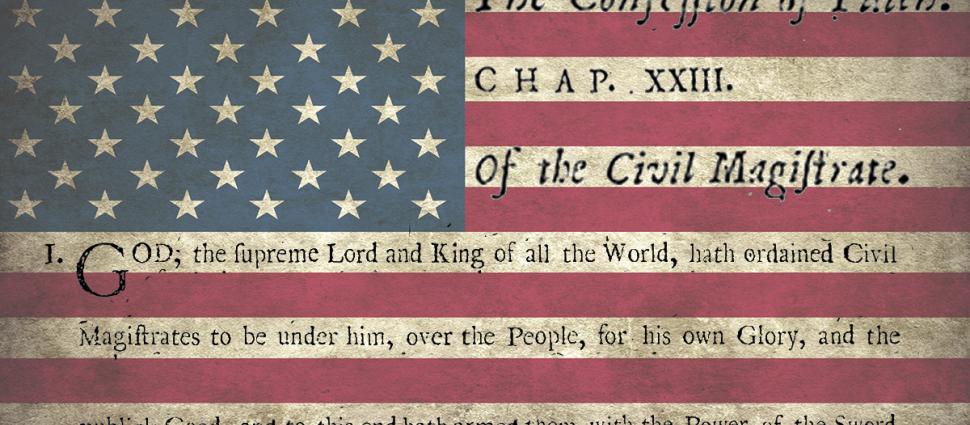The 23rd of the Confession for the 4th of July

There is a great deal of confusion in society today about the roles of the Church and the State. What is the relationship between to the two? How does a Christian live in this current American context in a faithful and biblical way? Thankfully, chapter 23 of the Westminster Confession of Faith explains what the Scriptures teach about the nature of the relationship between the Church and the State.
The first phrase is perhaps the most important part of the whole chapter. If understood correctly, then the rest of the chapter just makes good sense. “God, the supreme Lord and King of all the world, has ordained civil magistrates to be under him over the people, for his own glory and the public good” (WCF 23.1). When Westminster uses language like “the Civil Magistrate,” it is referring to all agents of government here on earth: local, state, national, and even international. God owns the whole earth and everything and everyone who is on it. He is THE Lord and King. Every civil authority that exists owes its being and its authority to God. The apostle Paul makes this abundantly, “For there is no authority except from God, and those that exist have been instituted by God” (Rom 13:1). The old Princeton theologian A.A. Hodge helpfully adds:
Some have supposed that the right or legitimate authority of human government has its foundation ultimately in ‘the consent of the governed,’ ‘the will of the majority,’ or in some imaginary ‘social compact’ entered into by the forefathers of the race at the origin of social life. It is self-evident, however, that the divine will is the source of all government” (The Westminster Confession: A Commentary, 2003. p. 293).1
God has ordained it this way. Whatever the nature of the civil authority, it owes its existence to the sovereign will of God. And there is a reason God has ordained this civil authority. It is instituted by God for his own glory and for the public good.
So how is the Christian to respond to the government if God is the One who instituted it? What is the duty of the Christian toward government? The Confession of Faith gives us four practical duties of the Christian toward government.2 We are to pray for those in authority. We are to honor our leaders. We are to pay what is due. And we are to obey their lawful commands (WCF 23.4).
Paul urges his young disciple Timothy that “supplications, prayers, intercessions, and thanksgivings be made for all people, for kings and all who are in high positions” (1 Tim 2:1, 2). God’s Word clearly instructs the Church to pray for all those in authority. This is easy when the guy we like is in office. But it is no less necessary when someone with whom we sharply disagree holds office. This command is irrespective of political beliefs.
We are also to honor those in authority. The apostle Peter gives four imperatives in 1 Peter 2:17. The Christian is to “honor everyone.” This is comprehensive. There is not a single person on earth that the Christian is not bound by God’s Word to honor...everyone. But those in the Church deserve more than just our honor. The second imperative is to “Love the brotherhood.” The third imperative is to “Fear God.” We are to reverence and esteem God as holy and mighty. Now, Peter could have stopped here and these three imperatives would have been very thorough. Honor, love, and fear. But he continues with a fourth imperative that seems to go back to the first, but adds a degree of emphasis. In case it wasn’t completely clear in the term “everyone,” Peter emphasizes that included in that term are those in authority; “Honor the emperor.” Government and those in authority are not to be viewed negatively. We are to honor those whom God has placed over us.
The third duty of the Christian toward the government is to pay what is due. The apostle Paul writes, “Pay to all what is owed to them” (Rom 13:7). And taxes are the first example Paul gives of what is owed. The government has the God-given right to levy taxes on its citizens and the citizens have the God-given responsibility to pay them. Next April when you grumble about your taxes, remember that God has both promised to provide for your daily bread and had commanded you to pay your taxes. To grumble and complain is to either believe God won’t provide sufficient for your needs or that you shouldn’t have to obey God’s commands.
Finally, the Christian is to obey the government’s lawful commands. Paul says in Romans that we ought to obey our authorities not only to avoid wrath but also “for the sake of conscience” (Rom 13:5). When we begin to disobey earthly authority, our consciences become hard, making it easier to disobey heavenly authority. We must never grow accustomed to the concept of disobedience. And yet, we should note that the Westminster Confession of Faith limits this obedience to “lawful commands.” Those unlawful commands which would cause us to sin against God must be disobeyed because “we must obey God rather than men” (Acts 5:29).
The apostle Peter could instruct the Church to submit to the authority of the government even while he was in prison and suffering under the persecution of “Babylon” (1 Pet 5:13). By “Babylon" Peter is referring to the pagan Emperor Nero. When Peter said “honor the Emperor," he had Nero in mind. No matter how bad the government may be in your opinion, we are to submit to it because, ultimately, we submit to God.
Perhaps this post has opened more questions that it has answered for you. It is my hope that God will give us grace to obey those clear biblical commands to pray for, honor, give what it due to and obey the lawful commands of the government God has placed over us.
1. Archibald Alexander Hodge, The Westminster Confession: A Commentary. Edinburgh, Scotland: Banner of Truth Trust, 2002. p. 293.
2. For a fuller development of this idea see Chad VanDixhorn's Confessing the Faith (Carlisle, PA: Banner of Truth, 2014) pp. 307ff. I have sought to summarize, in this post, his thoughts from his section on "Civil Government and Family."





